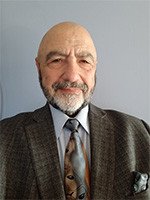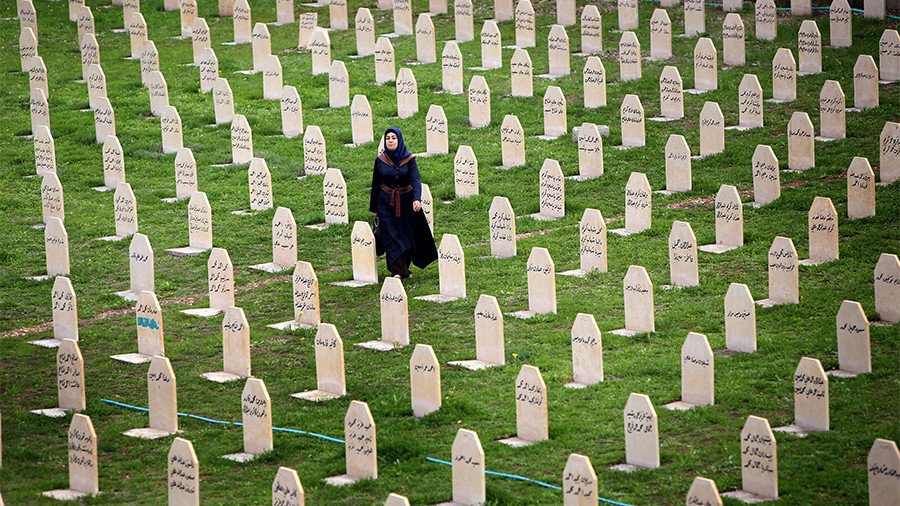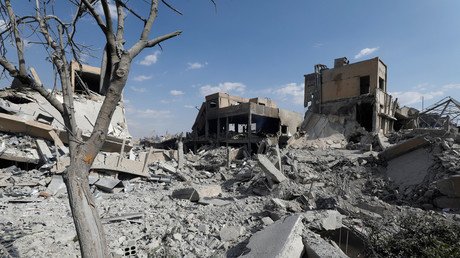US hypocrisy over its self-righteous military attack on Syria over a recent alleged use of not-yet-verified chemical weapons in Douma raises the question: Is gassing bad, but OK for some countries?
The reason for asking is the rush to judgment by the United States, Britain and France to bomb selected military locations in Syria, which these countries claim research and develop, manufacture and store chemical weapons.
Yet, the United States and some of its Western allies, including Great Britain, have a history of being complicit in a country's – namely Iraq's – use of chemical weapons if it suited their national interest.
So, where's the outrage? The silence is deafening.
"The shameless, outrageous, covert military support which the United States – and Britain – gave to Saddam for more than a decade remains the one terrible story which our presidents and prime ministers do not want the world to remember," said Robert Fisk, correspondent for The Independent based in Beirut.
In the most recent alleged chemical attack on Douma, there was an automatic assertion by Western countries that the Syrian government did it, stepping over a red-line by gassing its own people. While the US-led coalition attacks were limited for now, Israel and Saudi Arabia have a highly vested interest in pushing for the ouster of Assad and halting Iran's growing influence from Tehran in the Mediterranean. Their hope was that the US and its Western allies would do both, raising further questions as to whether the Douma attack was instigated by other regional players, knowing what US President Donald Trump's reaction had been to a chemical attack in Syria last year.
A year ago this month, the US had launched 59 Tomahawk missiles at a military base which was thought to be the location from which a Syrian aircraft was said to have taken off to bomb civilians in the town of Khan Shaykhun in the Idlib Governorate of Syria. However, there was no effort to allow inspectors to gather evidence before the US launched its attack.
A year later, we see the same scenario, with Trump ordering the latest bombing just as investigators from the Organization for the Prevention of Chemical Weapons were arriving in Syria to determine whether a chemical weapon was even used.
As for motive, the Syrian government had just reached an agreement with Jaysh al-Islam, a jihadist Salafist group associated with Al-Qaeda, to leave Douma in the East Gouta section just outside of Damascus. It would allow the Assad government to reclaim the area after years of control by the JAI.
While the JAI claimed that the government had used chlorine gas on civilians in Douma, the jihadist Salafist group admits to using chlorine gas against the Kurds in Aleppo in 2016.
For the US to act before any evidence could be gathered strongly suggests an effort to cover up evidence that might point fingers to the West.
Once again, a parallel can be made with the West trying to hide the truth. Once Saddam Hussein was put to death, Fisk said the secret of US and British complicity in Hussein's use of chemical weapons during the eight-year Iran-Iraq that began in September 1980 supposedly died with him.
"We've shut him up," said Fisk. "The moment Saddam's hooded executioner pulled the level of the trapdoor in Baghdad yester morning, Washington's secrets were safe… And now Saddam, who knew the full extent of that Western support – given to him while he was perpetrating some of the worst atrocities since the Second World War – is dead.
"…. Many in Washington and London must have sighed with relief that the old man had been silenced forever," Fisk added.And other self-righteous Western countries that now condemn Assad without proof of chemical-weapons use, were similarly complicit. Fisk points to a German arms dealer whom he had met, who had direct contacts "between Washington and Baghdad – at America's request."
The arms dealer told Fisk that he was invited to go to the Pentagon, where he was handed US satellite photographs of the Iranian front lines. Fisk's source then took the photos and maps of Iranian troop placements back to Baghdad via Frankfurt, flying from there on Iraqi Airways to the Iraqi capital. "The Iraqis were very, very grateful," Fisk said.
Iraq then used chemical weapons on the Iranians for the first time on January 13, 1981 out of concern that the Iranians were gaining a military advantage. He said the Iraqis for the first time had used a combination of nerve gas which would paralyze the victims' bodies, followed up with mustard gas and Sarin to "drown them in their own lungs. That's why they spat blood."
The Pentagon apparently was aware of Hussein's use of these chemical weapons. Lt. Col. Rick Francona, who was with the Defense Intelligence Agency at the time, provided members of the Iraqi general staff with detailed information on Iranian deployments, tactical planning and bomb-damage assessments. Francona "reported back to Washington that the Iraqis had used chemical weapons to achieve their victory in recapturing the Fao peninsula from the Iranians."
In an interview with Foreign Policy, Francona said that the Iraqis didn't have to tell Washington officials that they were using nerve gas. "They didn't have to," Francona said. "We already knew."
Then documents from the Central Intelligence Agency that were declassified revealed that the US knew of Iraqi's chemical weapons attacks. The declassified materials, which were in the National Archives, revealed details on the depth of US knowledge of how and when Iraq employed the deadly chemical weapons.
"They are tantamount to an official American admission of complicity in some of the most gruesome chemical weapons attacks ever launched," according to Foreign Policy.
High-level CIA officials also knew of the location of Iraqi chemical weapons assembly plants for mustard gas. Much of the manufacturing equipment for Hussein's regime to make chemical weapons came predominantly from Western European countries, including Italy – the same countries who now condemn Assad for the alleged use of chemical weapons without any proof.
However, Hussein wasn't content with using chemical weapons just on the Iranians. In 1987 and 1988, he decided to use them on the Kurds, who live in northern Iraq. The most egregious chemical weapons attack occurred in March 1988 in the Kurdish village of Halabja, killing some 6,800 Kurds, mostly civilians.
Even though President George W. Bush referred to Hussein's gassing of his own people as a justification for regime change, captured Iraqi secret police documents and declassified US government documents, as well as interviews with former US officials, reveal that the US was fully aware. At the time, Hussein blamed Iran for gassing the Kurds, but the US knew differently, with the State Department instructing its diplomats to say that Iran was partly to blame.
At the time of the chemical attack on civilians in Halabja, there was no reaction from the US or the UK or other countries on the attack. Brian K. Price, a military veteran, said that "there was no reaction by the US and the UK and other countries because the US calculated the coordinates for all of Saddam Hussein's sarin attacks, including the ones in Halabja."
In pointing a finger at Assad and claiming that Russian President Vladimir Putin was complicit in a chemical weapons attack in Douma, the US needs to atone for its own complicity in what it did by giving material assistance to Hussein for his use of chemical weapons. The US should have allowed for an impartial investigation prior to launching a military attack on Syria.
However, launching a military attack before the investigation strongly suggests that such evidence once again could point to Western complicity in Douma, given the US backing of the Jaysh al-Islam militant group associated with Al-Qaeda and the vital interests of other countries in the region. For now, however, we have confirmation of US complicity and assistance in Hussein's chemical warfare effort not only against Iran but also against innocent Iraqi citizens.
The statements, views and opinions expressed in this column are solely those of the author and do not necessarily represent those of RT.



